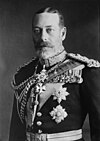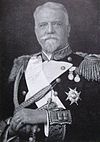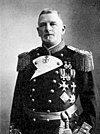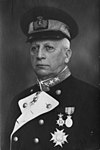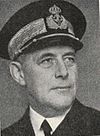Admiral (Sweden)
| Admiral Amiral | |
|---|---|
 Flag of the admiral | |
  Shoulder mark and sleeve insignia of a Swedish four-star admiral. | |
| Country | |
| Service branch | Swedish Navy |
| Abbreviation | Am (Swedish),[1] Adm (English)[2] |
| Rank group | Flag officer |
| Rank | Four-star[a] |
| Formation | 1522 |
| Next lower rank | Vice admiral |
| Equivalent ranks | General |
Admiral (Adm) (Swedish: Amiral, Am) is a four-star commissioned naval officer rank in the Swedish Navy. Admiral ranks immediately above vice admiral and is equivalent to general.
History
[edit]In Sweden, the admiral's rank first appeared during the reign of Gustav I, who in 1522 gave it to Erik Fleming, a Council of the Realm. During Gustav's reign as king and throughout the latter part of the 16th century, the highest command of a fleet was led by a översteamiral ("colonel admiral"), to whose assistant a underamiral was appointed. It was not until 1569 that a permanent översteamiral was appointed; In 1602 the title was exchanged for riksamiral ("Admiral of the Realm"). The first permanent underamiral was appointed in 1575; his office ceased in 1619. Vice admiral is first mentioned in 1577. The admirals of the Swedish Navy have, incidentally, been as follows: generalamiral ("general admiral"), amiralgeneral ("admiral general"), storamiral ("grand admiral"), överamiral, riksviceamiral ("Vice Admiral of the Realm"), amiralgenerallöjtnant ("admiral lieutenant general"), amirallöjtnant ("lieutenant admiral"), schoutbynacht and konteramiral ("rear admiral"). As names for special positions, there has been: befälhavande amiral ("commanding admiral"), skeppsgårdsamiral ("shipyard admiral"), holmamiral ("islet admiral") and varvsamiral ("shipyard admiral").[3]
Admiral is equivalent to the rank of general[3] in the Swedish Army, the Swedish Air Force, the Swedish Coastal Artillery (until 2000) and as well as in the Swedish Amphibious Corps (from 2000). Historically, during the 20th century, vice admirals were promoted one grade upon retirement to full four-star admiral. The last time this happened was in 1991 when vice admiral Bror Stefenson was promoted to admiral in connection with his retirement from the navy.[4] According to current practice only royals and the Supreme Commander of the Swedish Armed Forces, if he were to come from the Swedish Navy, can hold the rank of a full, four-star, admiral in Sweden.
Following a proposal from the Swedish Armed Forces, the Government of Sweden decides on employment as an admiral.[5]
In everyday speech, admirals of all ranks are addressed as admirals.[6][7]
Uniform
[edit]Shoulder mark
[edit]The shoulder mark of a Swedish admiral contains a 45 mm galloon m/51 and four[b] 25 mm star m/30 in silver embroidery on a white background: The center distance between the stars on the shoulder mark must be 27 mm.[8]
-
Shoulder mark of a Swedish admiral (1972–present)
-
Shoulder mark of a Swedish admiral (1878–1972)
Sleeve insignia
[edit]A flag officer wears on the sleeves a 45 mm galloon (GALON M/51 45MM K) and a rank insignia (GRADBETECKNING M/02 TILL ÄRM FLOTTAN) (round loop, the Amphibious Corps has a pointed loop in form of a grenade).[9]
-
Sleeve insignia for an admiral (2003–present)
-
Carl XVI Gustaf with current sleeve insignia for an admiral (2003–present)
-
Sleeve insignia for an admiral (1972–2003)
-
Carl XVI Gustaf with old sleeve insignia for an admiral (1972–2003)
-
Sleeve insignia for an admiral (1878–1972)
-
Jacket m/78 (1878) with long trousers and vest for admiral. Has been carried by Admiral Åke Lindemalm.
Hats
[edit]Peaked cap
[edit]A flag officer wears as embellishments a gold embroidered oak leaf wreath (known as scrambled egg) on the visor of the peaked cap (skärmmössa m/48). It also fitted with a hat badge (mössmärke m/78 off för flottan) and with a strap in form of a golden braid.[10]
-
Peaked cap model 1948 worn by Stig H:son Ericson.
-
Cap badge
-
Admiral's uniform. Once owned by King Oscar II and preserved at Livrustkammaren.
-
Admiral's peaked cap, once belonging to King Oscar II.
Side cap and winter hat
[edit]An officer wears a hat badge (mössmärke m/78 off) for the navy and another (mössmärke m/87 off) for amphibious units on the side cap (båtmössa m/48) and on the winter hat (vintermössa m/87).[11]
Personal flags
[edit]Admiral's command flag, which admirals of all ranks carry on ships, where they are as commanders. On a three-masted ship, an admiral's flag flies on top of the main mast (vice admiral's flies on the top of the fore-mast and rear admiral's on top of the mizzen-mast).[12] The command flag of an admiral (and a general) is a double swallowtailed Swedish flag. In the first blue field 4 five-pointed white stars placed two over two[13] (before 1972 by 3 stars placed one over two).
The flag of the admiral (and vice admiral and rear admiral) is flown on ships of the navy, from which officer of the rank now mentioned exercises his command, or on which he travels in the service, but not on ships on which he is in the capacity of exercise leader.[14]
A flag officer (for example an admiral) who holds the position of Supreme Commander, Chief of Operations, Chief of Navy, Chief of Maritime Component Command or naval force commander, may carry an admiral flag on a car in which the commander in question travels in uniform. On airplanes/helicopters, vice admirals (flag officers) may carry a command sign in the form of an image of an admiral flag.[15]
Gun salute
[edit]When raising or lowering flags of the commander's, squadron, department or division commander, a gun salute is given with 17 rounds for admiral (15 for vice admiral and 13 for rear admiral).[18]
List of admirals
[edit]The following have been promoted to the rank of admiral in the Swedish Navy between 1900 and 2024. This colour indicates that the person was appointed honorary admiral in the Swedish Navy.
See also
[edit]Footnotes
[edit]- ^ Admiral was a three-star rank until 1972 in the Swedish Armed Forces rank structure.
- ^ Four stars has been used for an admiral since 1972. Before that it was three stars.
- ^ a b The Supreme Commander of the Swedish Armed Forces used admiral's flag since 1942.[16]
- ^ a b Upon retirement.
References
[edit]Notes
[edit]- ^ "Försvarsmaktens föreskrifter om personaltjänst (FFS 2019:6)" (PDF) (in Swedish). Swedish Armed Forces. 2019-12-02. p. 3. Retrieved 17 August 2020.
- ^ "Försvarsmaktens gemensamma identitet – direktiv för användandet av Försvarsmaktens namn, profil och bild" (PDF). 1.3 (in Swedish). Swedish Armed Forces. 2013-09-16. p. 66. Archived from the original (PDF) on 2020-09-01. Retrieved 14 May 2019.
- ^ a b Meijer 1904, pp. 851–852
- ^ a b "Unik amiral i smyg". Svenska Dagbladet (in Swedish). 1992-01-12. p. 15. Retrieved 25 November 2022.
- ^ "Förordning om ändring i förordningen (2000:555) med instruktion för Försvarsmakten" (PDF) (in Swedish). Swedish Code of Statutes. 20 June 2005. p. 2. Retrieved 21 August 2020.
- ^ Etikett och god ton: Praktisk handbok i sättet att uppföra sig. 1 (in Swedish). Stockholm: Åhlén & Åkerlund. 1932. p. 130. SELIBR 1353820.
- ^ Handbok: parad 6: traditionsvård : H PARAD 6 2016 (PDF) (in Swedish). Stockholm: Försvarsmakten. 2017. p. 31. SELIBR 22459606.
- ^ Laestadius 2015, pp. 460–461
- ^ Laestadius 2015, pp. 449–450
- ^ Laestadius 2015, pp. 422–424
- ^ Laestadius 2015, p. 424
- ^ Stenfelt 1920, p. 11
- ^ Braunstein 2004, p. 111
- ^ Stenfelt 1920, p. 640
- ^ Reglemente: parad 2: flaggor, fälttecken & heraldik : R PARAD 2 2017 (PDF) (in Swedish). Stockholm: Försvarsmakten. 2017. pp. 22, 68. SELIBR 21483386.
- ^ a b c d Lybeck 1945, pp. 568–569
- ^ Handbok: parad 4: marinen : R PARAD 4 2017 (PDF) (in Swedish). Stockholm: Försvarsmakten. 2017. p. 14. SELIBR 21485968.
- ^ Stenfelt 1920, p. 454
- ^ Norberg 1992–1994, p. 440
- ^ Broomé 1975–1977, p. 358
- ^ Sveriges statskalender för år 1910 (PDF) (in Swedish). Uppsala: Fritzes offentliga publikationer. 1910. p. 207.
- ^ Sveriges statskalender för skottåret 1916 (PDF) (in Swedish). Uppsala: P.A. Nordstedt & Söner. 1916. p. 300.
- ^ Odelberg 1992–1994, p. 554
- ^ Unger 1945, p. 716
- ^ a b Sveriges statskalender för året 1933 (PDF) (in Swedish). Uppsala: Fritzes offentliga publikationer. 1933. p. 352.
- ^ Lybeck 1949, p. 491
- ^ Wikland 1975–1977, p. 634
- ^ Åberg 1982–1984, p. 424
- ^ Dahl & Bohman 1954, p. 452
- ^ Sveriges statskalender för skottåret 1948 (PDF) (in Swedish). Uppsala: Fritzes offentliga publikationer. 1948. p. 389.
- ^ Sveriges statskalender för skottåret 1952 (PDF) (in Swedish). Uppsala: Fritzes offentliga publikationer. 1952. p. 422.
- ^ Burling 1962, p. 290
- ^ Spiegelberg 1984, p. 404
- ^ Salander Mortensen 1996, p. 691
- ^ Jönsson 2000, p. 749
Sources
[edit]- Braunstein, Christian (2004). Svenska försvarsmaktens fälttecken efter millennieskiftet [The flags and standards of the Swedish armed forces after the turn of the millennium] (PDF). Skrift / Statens försvarshistoriska museer, 1101-7023 ; 7 [dvs 8] (in Swedish). Stockholm: Statens försvarshistoriska museer. ISBN 91-971584-7-X. SELIBR 9815350. Archived from the original (PDF) on 2018-05-22. Retrieved 2020-08-26.
- Broomé, Bertil (1975–1977). "A F Hjalmar Klintberg". Svenskt biografiskt lexikon (in Swedish). Vol. 21. National Archives of Sweden. Retrieved 31 August 2023.
- Burling, Ingeborg, ed. (1962). Vem är det: svensk biografisk handbok. 1963 [Who is it: Swedish biographical handbook. 1963] (in Swedish). Stockholm: Norstedt. SELIBR 9649168.
- Dahl, Torsten; Bohman, Nils, eds. (1954). Svenska män och kvinnor: biografisk uppslagsbok. 7 Sibylla-Tjällgren (in Swedish). Stockholm: Bonnier. SELIBR 53806.
- Jönsson, Lena, ed. (2000). Vem är det: svensk biografisk handbok. 2001 [Who is it: Swedish biographical handbook. 2001] (in Swedish). Stockholm: Norstedt. ISBN 9172850426. SELIBR 8261515.
- Laestadius, Patrik, ed. (2015). Reglemente: uniformsbestämmelser 2015 : Unibest FM 2015 (PDF) (in Swedish). Stockholm: Swedish Armed Forces. SELIBR 19513428. Archived from the original (PDF) on 22 January 2019.
- Lybeck, Otto (1949). "Carl August Ehrensvärd". Svenskt biografiskt lexikon (in Swedish). Vol. 12. National Archives of Sweden. Retrieved 31 August 2023.
- Lybeck, Otto, ed. (1945). Svenska flottans historia: örlogsflottan i ord och bild från dess grundläggning under Gustav Vasa fram till våra dagar. Bd 3 [1815-1945] (PDF) (in Swedish). Malmö: Allhem. SELIBR 795890.
- Norberg, Erik (1992–1994). "Fredrik W Otter, von". Svenskt biografiskt lexikon (in Swedish). Vol. 28. National Archives of Sweden. Retrieved 31 August 2023.
- Meijer, Bernhard, ed. (1904). Nordisk familjebok: konversationslexikon och realencyklopedi (in Swedish). Vol. 1 (New, rev. and rich ill. ed.). Stockholm: Nordisk familjeboks förl. SELIBR 8072220.
- Odelberg, Wilhelm (1992–1994). "A A Louis Palander af Vega". Svenskt biografiskt lexikon (in Swedish). Vol. 28. National Archives of Sweden. Retrieved 31 August 2023.
- Salander Mortensen, Jill, ed. (1996). Vem är det: svensk biografisk handbok. 1997 [Who is it: Swedish biographical handbook. 1997] (in Swedish). Stockholm: Norstedt. ISBN 91-1-960852-7. SELIBR 3681533.
- Spiegelberg, Christina, ed. (1984). Sveriges statskalender. 1984 (in Swedish). Stockholm: Liber. ISBN 91-38-90400-4. SELIBR 3682782.
- Stenfelt, Gustaf (1920). Svenskt nautiskt lexikon: praktisk uppslagsbok för sjömän och maskinfolk, skeppsredare, konsulatpersonal, sjöassuradörer, skeppsmäklare, jurister m.fl (in Swedish). Stockholm: Wahlström & Widstrand. SELIBR 28204.
- Unger, Gunnar (1945). "Wilhelm Dyrssen". Svenskt biografiskt lexikon (in Swedish). Vol. 11. National Archives of Sweden. Retrieved 31 August 2023.
- Wikland, Erik (1975–1977). "Henning V M Krusenstierna, von". Svenskt biografiskt lexikon (in Swedish). Vol. 21. National Archives of Sweden. Retrieved 31 August 2023.
- Åberg, Alf (1982–1984). "Otto E Lybeck". Svenskt biografiskt lexikon (in Swedish). Vol. 24. National Archives of Sweden. Retrieved 31 August 2023.









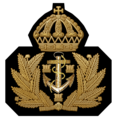


![Admiral/General[c] command flag (4 stars)[17] (1972–present)](http://upload.wikimedia.org/wikipedia/commons/thumb/e/e9/Naval_Rank_Flag_of_Sweden_-_Amiralsflagga.svg/120px-Naval_Rank_Flag_of_Sweden_-_Amiralsflagga.svg.png)
![Admiral/General[c] command flag (3 stars)[16] (1905–1972)](http://upload.wikimedia.org/wikipedia/commons/thumb/f/fd/Naval_Rank_Flag_of_Sweden_-_Viceamiralsflagga.svg/120px-Naval_Rank_Flag_of_Sweden_-_Viceamiralsflagga.svg.png)
![Admiral command flag (1875–1905)[16]](http://upload.wikimedia.org/wikipedia/commons/thumb/b/b6/Swedish_command_flag_%281875-1905%29_-_Admiral.svg/120px-Swedish_command_flag_%281875-1905%29_-_Admiral.svg.png)
![Admiral command flag (1836–1844)[16]](http://upload.wikimedia.org/wikipedia/commons/thumb/5/53/Swedish-Norwegian_command_flag_%281815-1844%29_-_Admiral.svg/120px-Swedish-Norwegian_command_flag_%281815-1844%29_-_Admiral.svg.png)







